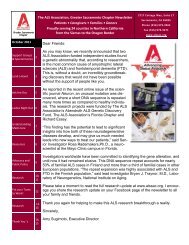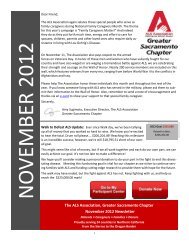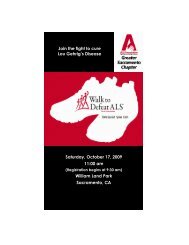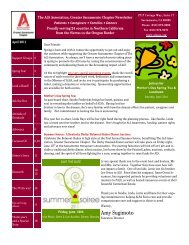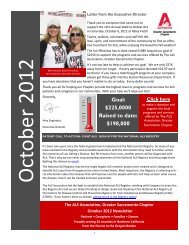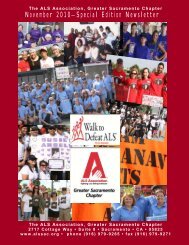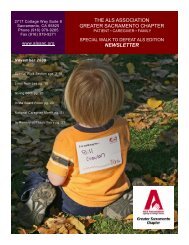Amy Sugimoto - Sacramento - ALS Association
Amy Sugimoto - Sacramento - ALS Association
Amy Sugimoto - Sacramento - ALS Association
You also want an ePaper? Increase the reach of your titles
YUMPU automatically turns print PDFs into web optimized ePapers that Google loves.
Research<br />
Page 6<br />
Genome Study Identifies Chromosome 9 Link to <strong>ALS</strong><br />
In an <strong>ALS</strong> <strong>Association</strong>-funded study conducted in Finland, researchers found that a major cause of familial <strong>ALS</strong> was located on<br />
chromosome 9p21. Finland is a well suited location for a genome-wide association (GWA) study of <strong>ALS</strong> because the incidence of<br />
the <strong>ALS</strong> is one of the highest in the world, and the genetic background of the Finnish population is relatively homogenous. Previous<br />
GWA studies have failed to identify a single location that is significant and can be replicated in other studies probably because<br />
of the heterogeneity of the disease.<br />
“Although GWA study has been a disappointing approach to find new genes linked to sporadic <strong>ALS</strong>, it is encouraging<br />
to see the approach used successfully in a more homogeneous population,” said <strong>ALS</strong> <strong>Association</strong> Chief Scientist<br />
Dr. Lucie Bruijn, Ph.D.<br />
In the study published in Lancet Neurology, 853 DNA samples were collected from 442 people with <strong>ALS</strong> and 521 control individuals.<br />
Control samples were from a population-based study of elderly Finnish individuals. People known to carry the SOD1 gene<br />
were included in the final analysis as positive controls to assess whether this genome-wide association study was able to detect an<br />
association signal.<br />
Two signal peaks were identified in the population that reached significance: one peak corresponding to the known autosomal recessive<br />
D90A mutation of the SOD1 gene and the second corresponding to chromosome 9p21.2 a location previously linked to<br />
autosomal dominant <strong>ALS</strong>, where the gene is passed from just one parent.<br />
The study therefore describes a major cause of familial <strong>ALS</strong> in the Finland located on chromosome 9p21. Furthermore, the overlap<br />
with the risk haplotype (a combination of DNA sequences) recently also reported for frontotemporal dementia provides further<br />
evidence of a shared genetic cause for these two neurodegenerative diseases. Although the investigators are currently unable<br />
to identify the specific genetic variation underlying this locus, it will be feasible to identify patients with chromosome 9p21-linked<br />
<strong>ALS</strong> by sequencing for this risk haplotype.<br />
The research team was led by Bryan Traynor, a neurogeneticist with the National Institute on Aging and with the Johns Hopkins<br />
School of Medicine. "We are very excited about this result because for the first time, we have been able to explain a large proportion<br />
of <strong>ALS</strong> cases in a population, Taynor said. “We will continue to pursue this chromosome 9 locus to understand how it<br />
gives rise to disease.”<br />
In addition to The <strong>ALS</strong> <strong>Association</strong>, funding for this project came from National Institutes of Health and National Institute on Aging,<br />
Microsoft Research, Helsinki University Central Hospital, Finnish Academy, Finnish Medical Society Duodecim, and Kuopio<br />
University.<br />
Specializing in Home Medical & Supplies<br />
2551 Warren Drive<br />
Rocklin, CA 95677<br />
Telephone (916) 624-0900 Fax (916) 624-9801<br />
S a l e s R e p r e s e n t a t i v e : B r i a n H a c k e t t , A T P<br />
R E S N A C e r t i f i e d T e c h n i c i a n




